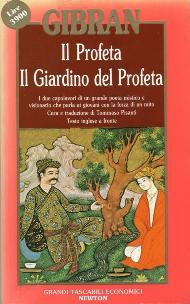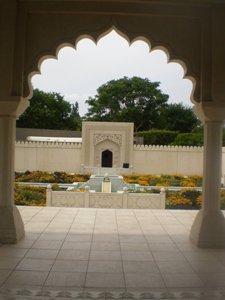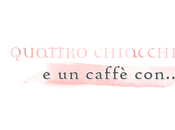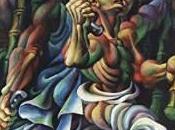
di Gibran Kahlil Gibran
Titolo: Il Profeta + Il Giardino del Profeta
Titolo originale: The Prophet + The Garden of the Prophet
Genere: filosofico
Autore: Gibran Kahlil Gibran (Wikipedia)
Nazione: libanese
Anno prima pubblicazione: 1923 + 1933
Ambientazione: un luogo e un tempo imprecisati e/o immaginari
Personaggi: il Profeta Almustafa, alcuni suoi discepoli e gli abitanti della sua città natale
Casa Editrice: Newton Compton (Grandi Tascabili Economici)
Traduzione: Tommaso Pisanti
Copertina: Miniatura del XVII secolo di Muhammad Qasim
Pagine: 202
Note: con testo inglese a fronte
Link al libro: IN LETTURA – ANOBII – GOODREADS
inizio lettura de Il Giardino del Profeta: 9 settembre 2014
fine lettura de Il Giardino del Profeta: 10 settembre 2014
Voto: 8/10

He alone who loses his way a thousand times shall have a home-coming.
(Pagine 172-73)
Solo colui che smarrisce mille volte la sua via troverà quella che lo riporta alla sua casa.
Ho comprato questo libro credo durante l’adolescenza, e ho subito letto e, se ricordo bene (e anche a giudicare dall’ingente numero di frasi che ho sottolineato) amato molto Il Profeta. Poi ho iniziato il secondo libro contenuto in questo volume, Il Giardino del Profeta, e non l’ho mai finito. Ripreso in mano tanti anni dopo per inserirlo in una sfida, ho scoperto che non è poi così male come temevo!
I due capolavori di un grande poeta mistico e visionario che parla ai giovani con la forza di un mito.
[dalla copertina, perché onestamente non sapevo proprio come riassumere la trama]
Il primo libro contenuto in questo volume l’ho letto eoni fa, quando da adolescente ero anch’io affascinata dalla cultura orientale e dalle frasi a effetto da ricopiare all’infinito sui diari (non c’era internet a quel tempo). Non sono cambiata poi tanto da allora sotto certo aspetti, certo è che le frasi a effetto ora lasciano il tempo che trovano, nella maggior parte dei casi. Così avevo un po’ paura a iniziare la lettura del seconod libro che già allora, evidentemente, non mi aveva particolarmente emozionato. Invece devo dire che mi ero sbagliata, la lettura mi è piaciuta!

prophet by fangogogo on deviantART
Inevitabile comunque il confronto tra i due. Il Profeta è molto più famoso, Il Giardino del Profeta non l’avrei neanche mai comprato se non fosse stato su questo volume. Il primo l’ho letto con tutto l’entusiasmo di sapere già che avrei amato ogni riga, il secondo l’ho iniziato con notevole scetticismo e un po’ di pregiudizio. Il primo è, probabilmente, davvero più bello del secondo, a prescindere dal periodo più adatto in cui l’ho letto. Poi, ancora, non so se sia stata la differenza di età in cui ho letto entrambi, ma Il Giardino del Profeta mi è sembrato in effetti un’opera più matura, più malinconica e disincantata. Ho letto che il libro è rimasto incompiuto, e confrontando l’incipit con quello de Il Profeta mi sorge il dubbio che forse Gibran ne avesse anche previsto un terzo. Infatti all’inizio de Il Profeta leggiamo che Almustafa si trova all’alba dei suoi giorni, mentre ne Il Giardino del Profeta si trova nel meriggio. Ovvio quindi pensare ad un libro conclusivo in cui il Profeta fosse al tramonto della vita. Chissà, penso che mi sarebbe piaciuto leggerlo.

Replica Indian Garden 3 by Bnspyrd on deviantART
Questi due libri non hanno una vera e propria trama né una vera ambientazione. Viene nominata la città immaginaria di Orfalese, di cui il Profeta era originario, e il protagonista vi torna all’inizio di entrambi i libri, e risponde alle domande di compaesani, amici e discepoli, depositando perle di saggezza sui più svariati argomenti. Gli altri personaggi, a parte un paio di eccezioni, non hanno nome, sono “una donna con un bambino al seno”, “un discepolo”, “un vecchio”, e cose così.
Il primo libro a suo tempo lo lessi in italiano, ma visto che ormai mi sono data alla lettura in lingua il seguito l’ho letto inglese. Lo stile di Gibran è ovviamente molto poetico, ma non difficile, anzi, se confronto l’originale con la traduzione a volta mi sembra più comprensibile in inglese!
La copertina di questa mia edizione non è male. Ha un’immagine che richiama l’oriente e anche il giardino del secondo testo. Il titolo è semplice ma mai come stavolta devo dire efficace: “Il Profeta”… quanta saggezza trasuda da quest’unica parola! :)

Il segnalibro che ho usato durante la lettura è stato realizzato da me. Non c’entra proprio nulla col libro in questione, ma andavo di fretta così ne ho preso uno a caso! :)
Commento generale.
Sia Il Profeta che Il Giardino del Profeta sono testi che con indubbia poesia raccontano verità sempre attuali, che, al di là del piacere di condividerle sui social network che fa sempre figo, sono concetti che non farebbe male ripassare ogni tanto, per ridimensionare un po’ la nostra visione del mondo, delle relazioni e della vita in generale.
Sfide
Una sfida semplice: tutti diversi (2014)La sfida grammaticale 2014
La sfida infinita 2014
Mini Recensioni 2014
Mount TBR Challenge 2014
La Sfida dell’Alfabeto 2014
Sfida delle letture in lingua 2014
Mini recensione in 5 parole parole
“Profezie” ancora attuali e interessantiUn po’ di frasi
(Un po’ tante questa volta, ma per pignoleria ho deciso di riportare anche tutte (ma proprio tutte) quelle che avevo segnato durante la mia prima lettura de Il Profeta tanti anni fa.)
Almustafa, the chosen and the beloved, who was a dawn unto his own day, had waited twelve years in the city of Orphalese for his ship that was to return and bear him back to the isle of his birth.Almustafa, l’eletto e l’amato, come un’alba verso il suo giorno, aveva atteso dodici anni nella città di Orfalese che ritornasse la sua nave e lo riportasse nella sua isola nativa.[incipit de Il Profeta]And his soul cried out to them [...]:How often have you sailed in my dreams. And now you come in my awakening, which is my deeper dream.[...]And then shall I come to you, a boundless drop to a boundless ocean.E la sua anima gridò verso di loro [...]:Quante volte veleggiaste nei miei sogni! Ed ora giungete al mio risveglio, che è il mio sogno più profondo.
[...]
E poi verrò a te, goccia infinita in oceano infinito.(Pagine 16-17)When love beckons to you follow him,Though his ways are hard and steep.And when his wings enfold you yield to him,Though the sword hidden among his pinions may wound you.And when he speaks to you believe in him,Though his voice may shatter your dreams as the north wind lays waste the garden.Quando l’amore vi chiama seguitelo,
Benché le sue vie siano ardue e ripide.
E quando le sue ali vi avvolgono, abbandonatevi a lui,
Anche se la spada tra le sue penne può ferirvi.
E quando esso vi parla, credetegli,
Anche se la sua voce può infrangere i vostri sogni come il vento del nord quando devasta il vostro giardino.(Pagine 22-23)To be wounded by your own understanding of love;And to bleed willingly and joyfully.Essere feriti dalla stessa comprensione d’amore;
E sanguinare volentieri e con gioia.(Pagine 24-25)Fill each other’s cup but drink not from one cup.Give one another of your bread but eat not from the same loaf.Riempia ognuno la coppa dell’altro, ma non bevete da una coppa sola.
Scambiatevi il pane, ma non mangiate dalla stessa pagnotta.(Pagine 26-27)And a woman who held a babe against her bosom said, Speak to us of Children.And he said:Your children are not your children.They are the sons and daughters of Life’s longing for itself.They come through you but not from you,And though they are with you, yet they belong not to you.You may give them your love but not your thoughts,For they have their own thoughts.[...]You may strive to be like them, but seek not to make them like you.[...]You are the bows from which your children as living arrows are sent forth.The Archer sees the mark upon the path of the infinite, and He bends you with His might that His arrows may go swift and far.Let your bending in the Archer’s hand be for gladness;For even as he loves the arrow that flies, so He loves also the bow that is stable.E una donna che reggeva un bambino al seno disse: Parlaci dei Figli.
Ed egli disse:
I vostri figli non sono i vostri figli.
Sono i figli e le figlie dell’ardore che la Vita ha per se stessa.
Essi vengono attraverso di voi, ma non da voi,
E benché vivano con voi, non vi appartengono.
Potete dar loro il vostro amore, ma non i vostri pensieri,
poiché essi hanno i loro propri pensieri.
[...]
Potete sforzarvi di essere simili a loro, ma non cercate di rendere essi simili a voi.
[...]
Voi siete gli archi da cui i vostri figli come frecce vive, sono scoccate.
L’Arciere vede il bersaglio sul sentiero dell’infinito, e vi piega e vi flette con la sua forza perché le sue frecce vadano veloci e lontane.
Fate che sia gioioso e lieto questo vostro esser piegati dalla mano dell’Arciere:
Poiché come ama la freccia che scaglia, così Egli ama anche l’arco che è saldo.(Pagine 28-29)He who works in marble [...] finds the shape of his own soul in the stone [...].And he who seizes the rainbow to lay it on a cloth in the likeness of man… [...].Not in sleep, but in the overwakefulness of noontide, that the wind speaks not more sweetly to the giant oaks than to the least of all the blades of grass;And he alone is great who turns the voice of the wind into a song made sweeter by his own loving.Chi lavora col marmo [...] scopre nella pietra la forma della sua propria anima [...].
E chi afferra l’arcobaleno per distenderlo su una tela in un’effigie umana… [...].
Non è nel sonno ma è nella pienezza del meriggio che il vento parla non più dolcemente alle querce giganti che al più piccolo di tutti i fili d’erba;
E che solo è grande chi volge la voce del vento in un canto reso più dolce dal suo proprio amore.(Pagine 38-39)Then a woman said, Speak to us of Joy and Sorrow.And he answered:Your joy is your sorrow unmasked.And the selfsame well from which your laughter rises was oftentimes filled with your tears.And how else can it be?The deeper that sorrow carves into your being, the more joy you can contain.[...]When you are joyous, look deep into your heart and you shall find it is only that which has given you sorrow that is giving you joy.When you are sorrowful look again in your heart, and you shall see that in truth you are weeping for that which has been your delight.Some of you say, «Joy is greater than sorrow», and others say, «Nay, sorrow is the greater».But I say unto you, they are inseparable.Together they come, and when one sits alone with you at your board, remember that the other is asleep upon your bed.Allora una donna disse: Parlaci della Gioia e del Dolore.
Ed egli rispose:
La vostra gioia è il vostro dolore senza la maschera.
E il pozzo da cui scaturisce il vostro riso fu spesso pieno delle vostre lacrime.
E come potrebbe essere diversamente?
Quanto più penetra e scava il dolore dentro di voi, tanta più gioia potrete contenere.
[...]
Quando siete gioiosi, guardate a fondo nel vostro cuore, e vedrete che solo quello che vi ha dato dolore vi dà ora gioia.
Quando siete dolenti, guardate ancora nel vostro cuore, e vedrete che state in realtà piangendo per quello che vi ha dato diletto.
Alcuni di voi dicono: «La gioia è più grande del dolore», ed altri dicono, «No, il dolore è più grande».
Ma io vi dico che essi sono inseparabili.
Essi giungono insieme, e quando l’uno siede con voi alla vostra mensa, ricordate che l’altro dorme sul vostro letto.(Pagine 42-43)Your clothes conceal much of your beauty, yet they hide not the unbeautiful.L’abito copre in voi gran parte della bellezza, e tuttavia non cela ciò che è meno bello.(Pagine 48-49)You can muffle the drum, and you can loosen the strings of the lyre, but who shall command the skylark not to sing?Potrei soffocare il suono del tamburo e allentare le corde della lira, ma chi ordinerà all’allodola di non cantare?(Pagine 60-61)You can only be free when even the desire of seeking freedom becomes a harness to you, and when you cease to speak of freedom as a goal and a fulfillment.You shall be free indeed when your days are not without a care nor your nights without a want and a grief,But rather when these things girdle your life and yet you rise above them naked and unbound.And how shall you rise beyond your days and nights unless you break the chains which you at the dawn of your understanding have fastened around your noon hour?In truth that which you call freedom is the strongest of these chains, though its links glitter in the sun and dazzle your eyes.[...]And if it is a care you would cast off, that care has been chosen by you rather than imposed upon you.And if it is a fear you would dispel, the seat of that fear is in your heart and not in the hand of the feared.[...]And thus your freedom when it loses its fetters becomes itself the fetter of a greater freedom.Liberi voi potete essere soltanto quando anche il desiderio di ricerca di libertà diventerà una bardatura per voi, e quando cesserete di parlare della libertà come di una fine e di un compimento.
Sarete davvero liberi non quando i vostri giorni saranno privi di affanni e le vostre notti saranno senza carenze e dolore,
Ma, piuttosto, quando queste cose cingeranno la vostra vita e tuttavia voi vi leverete al di sopra nudi e senza vincoli.
E come potrete elevarvi oltre le notti e i giorni vostri senza infrangere le catene che all’alba della vostra conoscenza allacciarono il vostro meriggio?
In verità, quella che chiamate libertà è la più forte di queste catene, anche se i suoi anelli vi abbagliano scintillando nel sole.
[...]
E se volete liberarvi di un affanno, quell’affanno è stato scelto da voi piuttosto che imposto a voi.
E se volete dissipare un timore, la sede di quel timore è nel vostro cuore e non nella mano di colui che v’incute timore.
[...]
E così la vostra libertà: nel momento in cui perde i suoi vincoli diventa essa stessa vincolo per una libertà più grande.(Pagine 62-65)Among the hills, when you sit in the cool shade of the white poplars, sharing the peace and serenity of distant fields and meadows – then let your heart say in silence, «God rests in reason».And when the storm comes, and the mighty wind shakes the forest, and thunder and lightning proclaim the majesty of the sky, – then let your heart say in awe, «God moves in passion».Quando, tra i colli, sedete alla fresca ombra dei bianchi pioppi, e vi sentite parte voi stessi della pace e serenità dei campi e prati lontani – vi sussurri allora il cuore: «Dio poggia sulla ragione».
E quando arriva la tempesta, e il possente vento scuote la foresta, e tuoni e lampi proclamano la maestà dei cieli – dica allora con ammirato timore il vostro cuore: «Dio si muove nella passione».(Pagine 66-69)Your friend is your needs answered.[...]And when he is silent your heart ceases not to listen to his heart;For without words, in friendship, all thoughts, all desires, all expectations are born and shared, with joy that is unacclaimed.When you part from your friend, you grieve not;For that which you love most in him may be clearer in his absence [...].For it is his to fill your need, but not your emptiness.And in the sweetness of friendship let there be laughter, and sharing of pleasures.For in the dew of little things the heart finds its morning and is refreshed.Il vostro amico è la vostra esigenza soddisfatta.
[...]
E egli tace, il vostro cuore non smette di ascoltare il suo cuore;
Poiché, nell’amicizia, pensieri, desideri, attese, tutto nasce ed è condiviso senza parole, con una gioia prima vi plauso.
Se vi separate dall’amico, non rattristatevi;
Poiché ciò che maggiormente amate in lui può meglio risplendere nell’assenza [...].
Poiché a lui tocca colmare ogni vostro bisogno, ma non il vostro vuoto.
E nella dolcezza dell’amicizia fate che vi siano il riso e la compartecipazione ai piaceri.
Poiché nella rugiada delle piccole cose il cuore scopre il suo mattino e ne è risporato.(Pagine 76-79)For thought is a bird of space, that in a cage of words may indeed unfold its wings but cannot fly.[...]When you meet your friend on the roadside or in the market place, let the spirit in you move your lips and direct your tongue.Let the voice within your voice speak to the ear of his ear;For his soul will keep the truth of your heart as the taste of the wine is remembered.When the colour is forgotten and the vessel is no more.Poiché il pensiero è un uccello dell’aria, che in una gabbia di parole può anche spiegare le ali, ma senza poter volare.
[...]
Se sulla strada o nella piazza del mercato incontrate l’amico, lasciate che lo spirito che è in voi muova le vostre
labbra e diriga la vostra lingua.
Lasciate che la voce che è dentro la vostra voce parli all’orecchio del suo orecchio;
Poiché la sua anima custodirà la verità del vostro cuore così come si ricorda il sapore del buon vino.
Anche quando il colore è dimenticato e la coppa è perduta.(Pagine 80-81)Shall the nightingale offend the stillness of the night, or the firefly the stars?[...]And your body is the harp of your soul,And it is yours to bring forth sweet music from it or confused sounds.L’usignolo offende forse il silenzio della notte, o la lucciola le stelle?
[...]
E il corpo è l’arpa dell’anima,
E tocca a voi ricavarne dolce armonia o confusi suoni.(Pagine 94-95)If you would indeed behold the spirit of death, open your heart wide unto the body of life. For life and death are one, even as the river and the sea are one.[...]Trust the dreams, for in them is hidden the gate to eternity.[...]And what is it to cease breathing but to free the breath from its restless tides, that it may rise and expand and seek God unencumbered?Only when you drink from the river of silence shall you indeed sing.And when you have reached the mountain top, then you shall begin to climb.And when the earth shall claim your limbs, then shall you truly dance.Se davvero volete contemplare lo spirito della morte, spalancate il cuore al corpo della vita.
Perché la vita e la morte sono una sola cosa, come il fiume ed il mare.
[...]
Fidatevi dei sogni, poiché in essi è nascosta la porta all’eternità.
[...]
E che cos’è questo cessare di respirare, se non liberare il respiro dalle sue incessanti maree, di modo che esso possa infine elevarsi ed espandersi e spaziare senza più intralci alla ricerca di Dio?
Solo se bevete al fiume del silenzio canterete veramente.
E quando avrete raggiunto la vetta del monte, è allora che comincerete a salire.
E quando la terra reclamerà le vostre membra, allora danzerete veramente.(Pagine 104-107)Was it I who spoke?Was I not also a listener?[...]And though death may hide me, and the greater silence enfold me, yet again will I seek your understanding.And not in vain will I seek.[...]The mist that drifts away at dawn, leaving but dew in the fields, shall rise and gather into a cloud and then fall down in rain.[...]But sweeter still than laughter and greater than longing came to me.It was boundless in you;The vast man in whom you are all but cells and sinews;He in whose chant all your singing is but a soundless throbbing.It is in the vast man that you are vast,And in beholding him that I beheld you and loved you.Sono io che ho parlato?
Non sono stato io anche un ascolttore?
[...]
E se anche la morte mi celasse a voi e il grande silenzio dovesse avvolgermi, ancora io cercherò la vostra comprensione.
E non cercherò invano.
[...]
La nebbia che all’alba si dilegua e lascia solo rugiada nei campi si alzerà per raccogliersi in nuvola e ricadere in pioggia.
[...]
Ma ancora più dolce del vostro riso e più grande del vostro ardore venne a me
L’illimitato che è in voi;
L’uomo immenso nel quale voi tutti non siete che cellule e tendini;
Nel cui coro ogni vostro canto non è che muto singhiozzo.
È nell’uomo immenso che voi siete immensi,
Ed è guardando a lui che io ho guardato a voi e vi ho amato.(Pagine 108-113)
explicit de 'Il Profeta' Leggi
And when all the people were dispersed she still stood alone upon the sea-wall, remembering in her heart his saying:
«A little while, a moment of rest upon the wind, and another woman shall bear me».
E quando la folla si disperse, ancora restò lì, sola sul molo, ricordando nel cuore le sue parole:
«Un attimo, un momento di calma nel vento, e un’altra donna mi partorirà».
tra un sonno e un altro sonno. Ma io guarderò fissamente il mare.
[...]
Quando la Vita parla, tutti i venti divengono parole; e quand’essa riparla, si trasformano in parole anche i sorrisi sulle vostre labbra e le lacrime nei vostri occhi. Quando la Vita canta, i sordi odono e sono creduti; e quando essa s’accosta i ciechi la guardano e restano stupefatti e la seguono con stupore e con sbalordimento.
Qui cessò di parlare, e un silenzio vasto avvolse la folla, e nel silenzio c’era un non udito canto, e tutti trovarono conforto alla lorosolutidine e al loro penare.(Pagine 132-137)Pity the nation that acclaims the bully as hero, and that deems the glittering conqueror bountiful.Abbiate compassione della nazione che acclama il prevaricatore come eroe, e considera generoso lo scintillante conquistatore.(Pagine 140-41)Is it not that which you have never striven to reach, into whose heart you have never desired to enter, that you deem ugliness?If ugliness is aught, indeed, it is but the scales upon our eyes, and the wax filling our ears.Call nothing ugly, my friend, save the fear of a soul in the presence of its own memories.Non è ciò che mai ti sei sforzato di raggiungere, e nel cui cure non hai mai desiderato di entrare, che chiami bruttezza?
Se la bruttezza è qualcosa, non è che il velo davanti ai tuoi occhi e la cera che riempie le tue orecchie.
Non chiamare brutto alcunché, amico mio, se non il timore di un0anima in presenza dei suoi ricordi.(Pagine 156-57)«Master, I am afraid of time. It passes over us and robs us of our youth, and what does it give in return?»[...]« [...] What are the seasons of the years save your own thoughts changing? Spring is an awakening in your breast, and summer but a recognition of your own fruitfulness. Is not autumn the ancient in you singing a lullaby to that which is still a child in your being? And what, I ask you, is winter save sleep big with the dreams of all the other seasons?»«Maestro, ho paura del tempo. Passa sopra di noi e ci deruba della nostra giovinezza, e che cosa ci dà in cambio?».
[...]
« [...] Che cosa sono le stagioni degli anni se non i vostri pensieri che cambiano? La primavera è un risveglio nei vostri petti, e l’estate nient’altro che il riconoscimento della vostra fecondità. E non è l’autunno l’antico che canta in voi una nenia al fanciullo che ancora è nel vostro essere? E che cosa, vi chiedo, è l’inverno se non un sonno gonfio dei sogni di tutte le altre stagioni?».(Pagine 158-59)Drink your cup alone though it taste of your own blood and tears, and praise life for the gift of thirst. For without thirst your heart is but the shore of a barren sea, songless and without a tide. Bevi la tua tazza da solo anche se ha il sapore del tuo sangue e delle tue lacrime, e loda la vita per il dono della sete. Perché senza sete il tuo cuore non è che la riva di un mare sterile, senza canti e senza una marea.*(Pagina 164)
explicit de 'Il Giardino del Profeta' Leggi
O Mist, my sister, my sister Mist,
I am one with you now.
No longer am I a self.
The walls have fallen,
And the chains have broken;
I rise to you, a Mist,
And together we shall float upon the sea until life’s second day,
When dawn shall lay you, dewdrops in a garden,
And me a babe upon the breast of a woman.
O Bruma, sorella, mia sorella Bruma,
Sono tutt’uno con te ora.
Non più sono un singolo io.
Le mura sono cadute,
e le catene si sono infrante;
Salgo ora a te, Bruma anch’io,
E insieme fluttueremo sopra il mare fino al secondo giorno della vita,
Quando l’alba ti poserà, gocce di rugiada in un giardino,
e poserà me infante sul seno di una donna.
*






